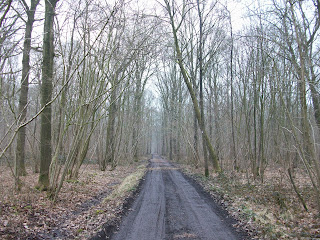Almost 100 years ago, British and German trenches marked this field, along with the numerous scars of bombs, mortars and barbed wire. Today, all I can see is a farm sitting 200-300 yards in the distance of this wide, flat field. The only remembrance of war, and the magnificent event that happened here is a cross to my right.
The cross which marks the spot of the 1914 World War I Christmas Truce is encircled with soccer balls and leis of flowers. The humble wooden cross, erected by the Khaki Chums, reads "Lest we forget."
Lest we forget the shining moment in a war of darkness. Lest we forget that we are all humans and our differences are not that big.
Christmas Day, 1914, the British and the German forces laid down their arms to celebrate the birth of our lord and savior. The two sides exchanged gifts, chocolates, cigars, and even played a friendly soccer match in No-Man's Land.
The truce lasted for a week before higher ups in the British Army got wind of the truce and forced their men to get back to fighting. But, for a week, there was quiet on the front. There was peace on earth in the region of Ploegsteert Wood.
I stand here today, my feet touching the same hallowed ground of those exceptional men that put aside their differences and came together.
I started my day by waking up and catching the train to Armentierès, where I was picked up by my tour guide Claude. We preceded to Ploegsteert, with our first stop being at the memorial. The memorial is a white, domed, Greek styled structure that commemorates those fallen in the sector. Two grave sites surround it on the sides, as do two lions. One lion looks toward the enemy side with a fierce expression, why the other has a calm expression, looking towards peace.
The we drove neared the wood, stopping by some grave sites. All the time, Claude told me about certain areas and their importance.
We walked into the wood. The same woods that the British occupied during the war. We walked the muddy back roads as I listened to the chirp of birds. Leaves covered the floor of the wood, as tall, skinny trees stood naked this winter day. Claude told me that there are hardly any trees older than 100 years here, as those that were not destroyed during the war were used in the rebuilding of the town after the war.
I saw sites of importance to me. Sites that I had read about while researching my historical fiction, short story, places I had scene in pictures, but was now witnessing with my own eyes. I took it all in; the sounds, the smells, the sights.
Claude also showed me a crater of an exploded mine. The hole was about 30-35 yards (meters) in width and was originally 20 yards deep. I saw the church in Messines, which was reduced to 4 meters of rubble during the war. The catacomb beneath the church was still usable and the Germans used it for headquarters. Hitler visited this room. Today, the church stands once more, reconstructed to look like the original.
With my tour over, Claude dropped me back off in Armentierès and I had some down time before I had to catch my train back to Lille, and from there to Brussels. I reflected on the events of the day, the whole reason for my weekend trip. I had gone to a place that I never thought I would get a chance to see, at least not so early in my life. But, now that I have seen it, I hope to use the information gained to complete my short story and keep the memory of the truce alive, lest we forget.
A Carol from Flanders - Frederick Niven
In Flanders on the Christmas morn
The trenched foemen lay,
the German and the Briton born,
And it was Christmas Day.
The red sun rose on fields accurst,
The gray fog fled away;
But neither cared to fire the first,
For it was Christmas Day!
They called from each to each across
The hideous disarray,
For terrible has been their loss:
"Oh, this is Christmas Day!"
Their rifles all they set aside,
One impulse to obey;
'Twas just the men on either side,
Just men — and Christmas Day.
They dug the graves for all their dead
And over them did pray:
And Englishmen and Germans said:
"How strange a Christmas Day!"
Between the trenches then they met,
Shook hands, and e'en did play
At games on which their hearts were set
On happy Christmas Day.
Not all the emperors and kings,
Financiers and they
Who rule us could prevent these things —
For it was Christmas Day.
Oh ye who read this truthful rime
From Flanders, kneel and say:
God speed the time when every day
Shall be as Christmas Day.
Remnants of a communications trench
Hitler was here









Thank you so much for your writing on the 100th Anniversary! (Katalin from Hungary)
ReplyDelete